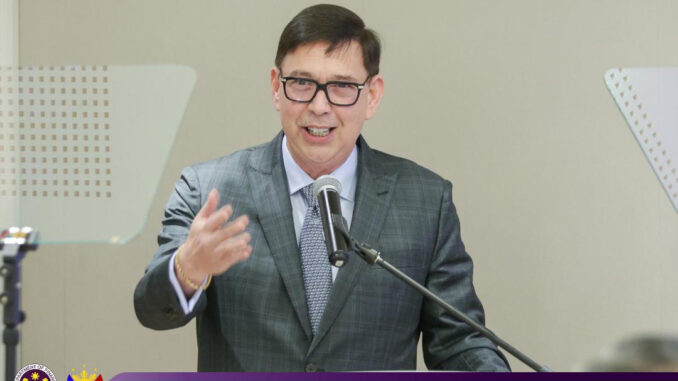
The Department of Finance (DOF) said the government’s financing initiatives are designed to meet the primary needs of Filipinos.
“Because that is our job at the DOF – to raise money for the government in the most cost-effective manner and make sure that it is most judiciously used and spent,” Finance Secretary Ralph Recto said in his keynote address at the Foundation for Economic Freedom (FEF) general membership meeting and election on Sept. 4, 2024.
Upon assumption as DOF Secretary in January 2024, Recto recalibrated the country’s Medium-Term Fiscal Program—covering revenue, financing and growth targets—to ensure that it aligns with current realities and adapts to external shocks such as geopolitical tensions.
The refined program follows a growth-enhancing fiscal consolidation path to reduce deficit and debt gradually in a realistic manner while creating more jobs, increasing incomes and decreasing poverty in the process.
The DOF said to fund this year’s national budget of P5.77 trillion, which is only supported by P4.27 trillion in revenues, it pursued prudent and strategic means to scout for more resources.
“[T]he DOF has to collect P11.71 billion a day in revenues to support our average daily spending of P15.80 billion. This leaves a P4.10-billion hole a day that must be plugged by debt,” Recto said.
“The temptation to impose additional taxes is there. But in the face of high inflation in the last two years, we chose other means of revenue generation that will not unduly burden ordinary Filipinos,” he said.
The DOF said it hiked the government-owned- or controlled corporations’ (GOCCs) dividend remittance rate from 50 percent to 75 percent of their earnings.
It is also strategically disposing of non-performing and idle government assets through privatization.
“These are now among our major sources of non-tax revenues,” Recto said.
Against its target of generating about P400 billion in non-tax revenues in 2024, the DOF collected P368.80 billion from January to July, up 44.5 percent from the same period last year.
Meanwhile, the Bureau of Internal Revenue (BIR) and Bureau of Customs (BOC) stepped up with higher collection performances through their respective digitalization programs and coordination with other agencies.
The BIR, in particular, is adapting its tax system to capture the e-commerce market to ensure that it will be able to collect rightful revenues from new business models.
“In addition, we have been inculcating tax obedience by promoting ease of payment not just through digitalization, but by showing that taxes that are efficiently collected are effectively spent,” Recto said.
As a result, tax collection grew by 11 percent in the first seven months of the year, reaching P2.24 trillion.
This drove total revenue collections to grow by 14.8 percent to P2.61 trillion from January to July 2024, putting the government on track to meet its fiscal targets for the year.
Recto said that as part of the recalibration of fiscal targets, the DOF’s priority revenue measures pending in Congress to collect more resources without placing undue burdens on the people.
“For our goal is to maximize gains, minimize pain, and ensure fairness and fiscal consolidation. Because these challenging times demand that we have to protect our revenue base and collect what is already on the table,” he said.
The measures include the imposition of value-added tax on foreign digital service providers, the excise tax on single-use plastic bags, package 4 of the comprehensive tax reform program, rationalization of the mining fiscal regime and the motor vehicle user’s charge.


Be the first to comment